The Curse Of Led Zeppelin
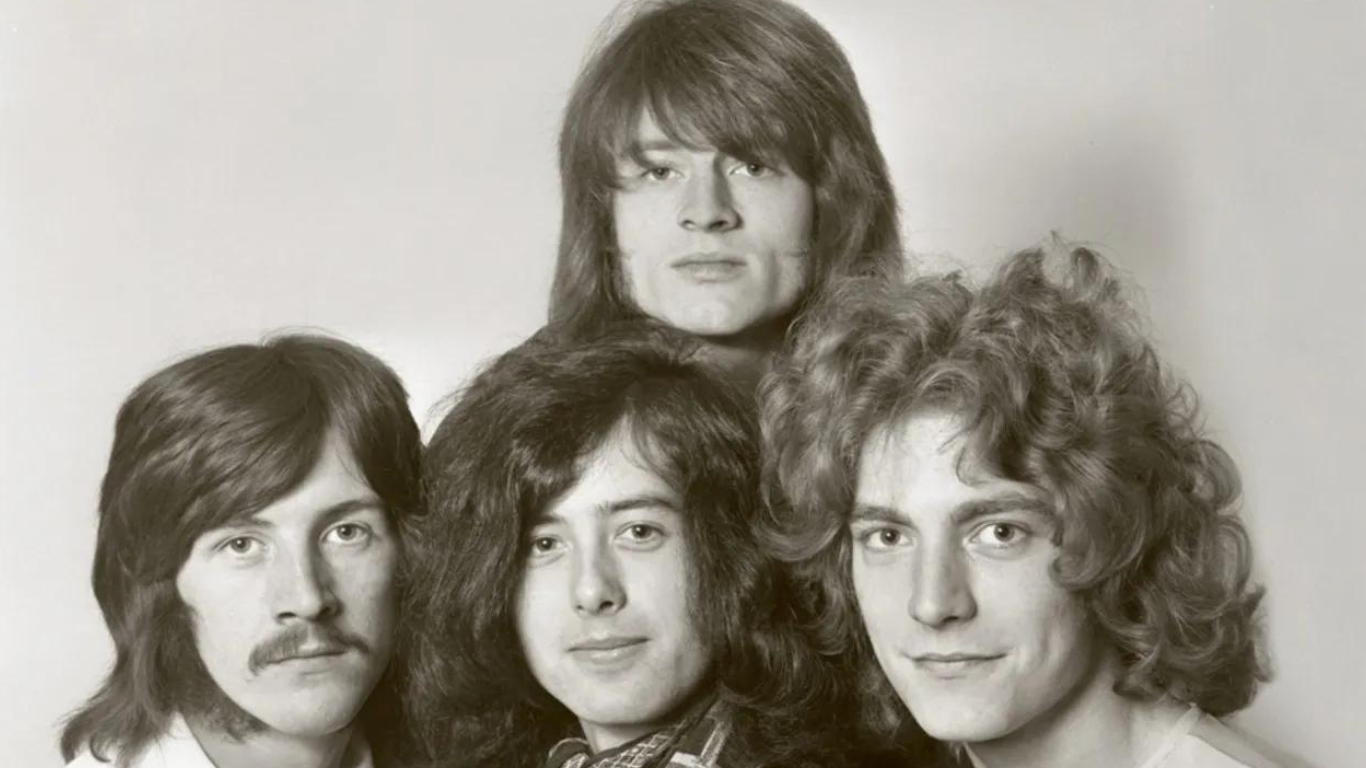
Jimmy Page, the erudite and softly-spoken lead guitarist of Led Zeppelin, once told a journalist, "I do not worship the devil, but magic does intrigue me; magic of all kinds."
Page, a native to Hounslow, West London, shook the world of rock and roll unlike any other star before him. Broodingly handsome, witty, and with a quirky and exotic taste, Page was a peacock among pheasants.
His circle was the most eccentric of the Age of Aquarius: finger-snapping, hash-smoking, LSD-dropping dandies. Page's circle, however, had a darker side entrenched in mystical Eastern esotericism and ancient magic: the occult.
Jimmy Page's peacocking connected him with many legends of rock and roll, from Eric Clapton to the Rolling Stones, both of whom he regularly jammed with as a session guitarist.
Page eventually founded Led Zeppelin - the experimental evolution of his former band, The New Yardbirds. Zeppelin, in his own words, came together like magic.

First, he found John Paul Jones, the bass guitarist; then Robert Plant, the lead singer; and finally, John Bonham, the drummer.
An unholy quaternity reflected by their personal symbols, or sigils. Admittedly, this was an unusual choice of logo for a band.
At the time, sigils were little known outside of esoteric circles.
A sigil is a symbol used in magic, often the pictorial signature of a demon or other spirit. Today, most frequently employed in chaos magic, they can be used for blessings just as they could be used for curses.
It's speculated that Page's foray into the occult may have had devastating consequences for him and his bandmates over a curious stretch of time.
Bad luck, accidents, sickness, and eventually several deaths would plague the band members and those close to them. This is known as the Curse of Led Zeppelin.
Many long-time Zeppelin fans, as well as occult researchers, say that Jimmy Page sold his soul, along with the souls of Robert Plant and John Bonham, to the devil.
It is often speculated that "Stairway to Heaven," Led Zeppelin's most famous song and often regarded as the most popular rock song of all time, was a product of the devil.
Besides the well-known theory that the song played backward is an audible ode to Satan, Robert Plant once said that the song came to him in a dream, and we must wonder, was it one similar to Tartine's?
The Rolling Stones began playing blues music fused with rock and roll in England.
The Stones would later cite Muddy Waters as their main source of inspiration. The song "Rolling Stone" was where they got their name.
Another artist who drew great inspiration from the blues was Jimi Hendrix, who claimed that Muddy Waters was the first guitarist he had ever heard.
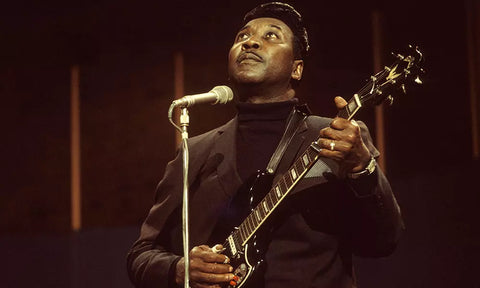
Artists like The Beatles, Cream, The Yardbirds, and The New Yardbirds were also inspired by the blues.
In 1998, Jimmy Page and Robert Plant even journeyed to the Mississippi Delta to pay tribute at the tombstones of dead bluesmen.
The supernatural has been with the blues for as long as the blues have been the blues.
References to the devil are made in countless blues albums and singles.
It is no surprise then that impressionable young British men inspired by the great bluesmen of their generation would also become interested in the supernatural.
Rock was becoming popular in England. There was a countercultural revolution taking place. The youth were growing out their hair, turning away from authority, and embracing freedom.
Jimmy Page was one of these long-haired British teenagers shunning societal norms.
The occult, for many young people at that time, including Page, was a polar opposite to the traditional Christianity that pervaded all sectors of British society, while the blues profoundly influenced Page and his generation's interest in the occult.
Aleister Crowley, a controversial and misunderstood figure, was often wrongly labeled as a Satanist. In truth, he was a magician, not a devil worshiper, though his interests lay in unlocking dimensions and engaging with the occult.
Crowley's involvement in the Golden Dawn society led to internal strife, ultimately resulting in its dissolution. He then founded the Ordo Templi Orientis, continuing his pursuit of esoteric magic.
Despite his intellect and charisma, Crowley's selfish and cruel nature alienated many, leaving him with few followers by the time of his death in Hastings, England.
It was not Crowley's life that was particularly remarkable to the teenagers of the 1960s with whom he became an icon, but rather his "Do what thou wilt" credo.
Musicians, beatniks, and rebels began to live according to this phrase. Ultimately, what Aleister Crowley and his teaching stood for was a rejection of society, self-gratification, and the pursuing of one's desires.
However depraved and however abstract it was, this attitude spurred the '60s countercultural revolution.
Young people became emboldened, courageous, and were finally able to enjoy themselves through sex, drugs, and rock and roll.
The occult was fashionable, most certainly, but with all types of fashion, we find people who take them much more seriously than others. One such person was Jimmy Page, who came in a way to almost worship Crowley, going as far as to join his organization, OTO, where he has remained a member for nearly 50 years.
Crowley's particular brand of magic was inspired by a spirit named Aiwass, who he channeled through his wife while in Cairo.
Thus, the magic he promoted was supposedly of the ancient Egyptians, which we can see from his religious texts and writings, as they are abound with references to a mystic secret form of Egyptian magic.
This too was something embraced by Jimmy Page. In the Victoria and Albert Museum in London, one of Page's stage outfits is displayed, adorned with the Eye of Horus enveloped in a pyramid.
What is for one person a passing breeze is for another a tornado that consumes every part of them.
For Jimmy Page, it appears that he was of the latter persuasion. Page's life has been shrouded in mystery. He is an elusive and intriguing figure and undoubtedly one of the greatest rock stars to ever walk on this earth.
A rock star unlike any other.
Jimmy Page, to his credit, was largely self-taught. He attended very few guitar classes and mastered the instrument on his own.
Page's interest in the occult also began young. As a schoolboy of 15, he read Aleister Crowley's "Magic and Theory in Practice." After coming across the book, he would later be quoted as saying, "Yes, that's it, my thing, I found it."
By the mid-1960s, Page had become an accomplished session guitarist and surrounded himself with groupies, hippies, and pot-smoking dropouts.
The sex, drugs, and rock and roll, however, were not enough for the young Jimmy Page.
After rising to fame in The Yardbirds, Jimmy founded a new quartet, Led Zeppelin.
Zeppelin was quickly signed to Atlantic Records and managed by Peter Grant.
Within a year, the band had gathered a cult-like following among rock fans in the United Kingdom, Europe, and the United States.
Fans immediately began to notice Page's fascination with the occult. In the few interviews he gave, he made frequent reference to the occult and his study of it.
He once told a journalist that, “You cannot ignore evil if you study the supernatural as I do. I have many books on the subject, and I've also attended a number of seances. I want to go on studying it.”
Page is thought to have asked his bandmates Robert Plant, John Bonham, and John Paul Jones to perform a ritual with him that would cement Led Zeppelin's name in rock and roll history and set them up for life.
The ritual, however, could not be spoken of. It would redefine their futures and that of Led Zeppelin.
Among occultists, this type of magic is not taken lightly. It involves the conjuring of ancient spirits, the gods of men.
These rituals, which would have been all too familiar to Aleister Crowley, should only be performed by experienced occultists and wizards; not half-stoned musicians.
One practitioner would later claim it is commonly thought that out of the quartet, the only member to refuse to participate in the ritual was John Paul Jones.
The trouble started for Led Zeppelin soon after their rise to popularity.
Coinciding with the alleged ritual, first Robert Plant was nearly killed in a serious car accident; then, just two weeks later, his Aston Martin fell on top of him and crushed him, breaking his ribs.
Perhaps this was an omen of the greater harm that was still to come; perhaps the half-stoned rockers of Led Zeppelin were not as great magicians as they thought they were.
Almost immediately, Led Zeppelin's fanbase began to swell, to become an indomitable and unforgettable rock force, still adored by millions to this day.
As Led Zeppelin's fame grew, so too did Jimmy Page's wealth and freedom to practice the occult without restraint, financially or otherwise. Page purchased Boleskine House on the shores of Loch Ness.
It was the former home of his idol, Aleister Crowley, and the supposed location of a ritual said to have torn the fabric of our universe and allowed evil unlike any other to enter into it.
Jimmy Page sold Boleskine House, stating that bad vibes ran through it, in 2015.
The evil of Boleskine House did not begin with Aleister Crowley, however. The earliest mention of death on the property is from the 10th century.
Jimmy Page’s obsession with Aleister Crowley was not limited to just buying his one-time home. Page bought an esoteric bookstore which was the namesake of Crowley's journal, "The Equinox."
Around the corner, Page purchased the infamous Tower House, a building long associated with paranormal activity.
One of his girlfriends, Pamela Debar, claimed that Page had her travel to San Francisco and Los Angeles to search for Crowley's lost artifacts. There, she was able to locate a number of manuscripts, pieces of magical apparatus, and Crowley's ritual robes.
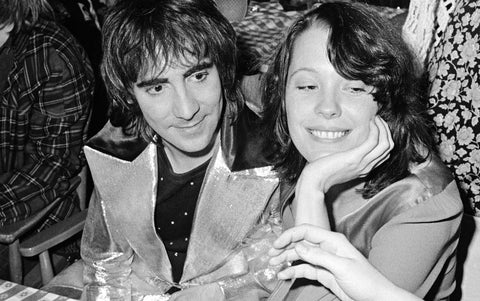
Page, of course, had his own robes. He often arrived on stage wearing custom-made one-off costumes. Possibly the most notorious of these was Page's infamous dragon suit, a black one-piece embroidered with his personal sigil, a full-length Chinese dragon, and astrological symbols.
Experienced occult practitioners assert that Page's costume was indeed a magical robe used in on-stage rituals.
Page's fascination with Crowley spilled over into Led Zeppelin's album covers and artwork too. On Led Zeppelin III, carved into the vinyl with a stylus, we find the inscription "So mote it be" on one side and on the other "Do what thou wilt." "Do what thou wilt" is a core article of faith in Crowley's Thelemic belief system and powerful magical incantations.
The infamous magician and friend of Page, William S. Burroughs, believes strongly in the power of electrical magic.

The idea of harnessing electricity to perform occult rituals, so a Thelemite magical incantation spinning on millions of turntables across the world at the same time, would make for a good example of this.
The other phrase, "So mote it be," originated among the Freemasons in English. It is customary to end a prayer with the word "amen," which is a Latin word meaning "so be it." The word "mote" in English is an archaic verb that means "might" or "may," so "mote it be" then means "so may it be."
In Freemasonry, every ceremony ends with these words, which is likely where Jimmy Page took it from. However, there is a more interesting theory.
In the Arabic language, "mo" or "almo" means death. "Somo" could, in theory, mean "so death it be."
When we consider Page's fascination with Eastern esotericism and ancient Egypt, the theory holds some weight.
By Led Zeppelin IV, the occult symbolism became painstakingly obvious, as if Page no longer made any attempts at hiding it.
On the inside of the album's cover was a painting of the Hermit, a tarot card symbol, and from left to right on the inner sleeve were four sigils representing Page, Jones, Bonham, and Plant, respectively.
Most of these sigils can be traced to Rudolph Coke's 1955 book of science, a work featuring a collection of ancient magical and alchemical symbols from across the world.
Robert Plant's sigil is said to be the feather of truth, a representation of the Egyptian goddess Maat.
John Bonham's was the least occult-like: a simple drum kit.
John Paul Jones's sigil was a Celtic symbol co-opted by Christianity to represent the Trinity among the Britons.

Page's personal sigil, an inscription that reads "Zoso," is harder to pin down. However, some say it originated in the famed black magic grimoire "Le Dragon Rouge," an arcane text which contains detailed instructions for making a pact with the devil. Page has publicly claimed that he will never tell anybody what the sigils mean; not least his own.
This is interesting in and of itself as occultists and chaos magicians ascertain that a powerful sigil must not be spoken of after the spell is cast, or the spell will backfire.
Page purportedly once revealed the meaning of the sigils in a quiet moment to an intoxicated Plant.
Plant would later say, "I was wasted at the time, and by the next morning, I had forgotten. I asked him the next day to tell me again, and he said he couldn't or wouldn't."
The band members themselves were not the only ones to receive their own personal sigils, however. Sandy Denny, a frequent collaborator, even got her own. Perhaps to her detriment, Denny would sadly become one of the first victims of the alleged curse of Led Zeppelin in 1976.
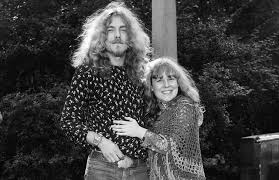
She suffered a dramatic downward spiral of mental illness and began throwing herself off flights of stairs.
In 1978, Denny was found at the foot of a staircase in her home, having fallen into a coma from which she would never awake.
The underground filmmaker, drug-taker, and freak Kenneth Anger first met Jimmy Page at an auction for some of Aleister Crowley's collectibles.
Page outbid Anger. The two became close shortly after, and Anger commissioned Page to compose a soundtrack for his latest project, "Lucifer Rising."

"Lucifer Rising" had, at that point, already been a chaotic production. The film's seven-year development had already gone awry after its lead actor, Bobby Beausoleil, a member of the Manson Family, had abruptly quit. Beausoleil stole rough cuts and cameras from the studio. To take his revenge, Kenneth Anger constructed a magic talisman on which one side there was a likeness of Beausoleil and on the other a toad.
Beausoleil would end up in prison for life within a year of the curse.
Jimmy Page happily agreed to perform the soundtrack for "Lucifer Rising." Time would tell, however, that Anger could not work with Page as he found the rock star's drug addictions impossible to accommodate.
After multiple delays, Page only delivered 20 minutes of music out of the 40 that Anger had paid for.
Anger was infuriated, and equally, Page became annoyed with Anger's demands to complete the job.
The project degenerated. Page pulled out, and he evicted Anger from Boleskine House, where he had allowed the filmmaker to live rent-free.
In response, Anger flamed in the media and publicly placed a curse on Jimmy Page and his band.
This curse, many claim, marked the beginning of the end for Led Zeppelin.
While Led Zeppelin had already experienced its fair share of tragedy, the real problems only began after Anger's supposed curse.
Mere months later, Robert Plant was nearly killed in a second, albeit more serious car crash, where he drove off a cliff in Greece.
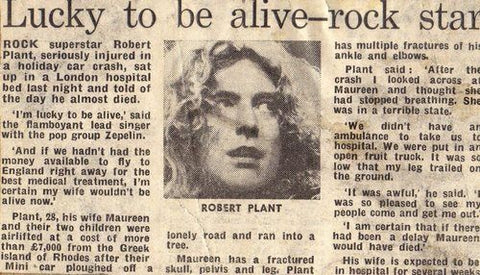
The accident nearly claimed his life and that of his wife and child.
Plant was wheelchair-bound for several performances. Afterwards, as soon as he recovered and prepared to tour, he was struck with serious laryngitis, leaving him unable to sing.
Plant's laryngitis caused the band to cancel the tour that was set to be Led Zeppelin's biggest tour ever, with tickets selling out at a rate of 72,000 per day.
This shocking cancellation was a catalyst for a riot in Cincinnati, where disgruntled and scorned fans stormed the planned venue.
Oddly, the scene of the Cincinnati riot would later become the scene of 11 deaths after The Who's notorious trampling incident just two years later.
When the tour eventually kicked off, an entire month late, there were major problems backstage.
A promoter's staff assaulted the band manager Peter Grant's 11-year-old son for taking a dressing room sign.
John Bonham saw this and kicked the man away from the child. Later, he informed Grant and two of the band's road crew of what happened, and they attacked the man.
In retaliation, all four of them were arrested on serious assault charges. In fact, they nearly found themselves sentenced to prison.
Only a short while after, Robert Plant received a phone call from his wife informing him that their five-year-old son Carrick had suddenly fallen ill. Two hours later, she called back; Carrick had died, and the band immediately canceled the remainder of the tour.
This absolute tragedy spiraled Plant and the rest of the band into their darkest days.
Plant withdrew from the public eye completely and returned to his family and farm in the West Midlands of England.
While all of these events were taking place, Jimmy Page was battling an intense heroin and cocaine addiction that saw him comatose from drugs on an almost daily basis.
Meanwhile, John Bonham was becoming a volatile alcoholic and grew more unpredictable by the day.
The events surrounding Bonham would, unfortunately, prove to be the undoing of Led Zeppelin. In 1980, after a day of extremely heavy drinking, he was sent home from a band rehearsal to Page's Windsor home.
A friend tucked him into bed, assuming that he would sleep it off. He died in his sleep.
After Bonham died, Led Zeppelin was over.
They released a statement: “We want it to be known that the loss of our dear friend and the deep respect we have for his family, together with the feeling of undivided harmony that we and our manager feel, have led us to decide that we can't continue as we were, rather than replace our drummer.” And then, Led Zeppelin chose to disband and would never release new music again.
The curse of Led Zeppelin is tragic, though no less compelling than the many mysteries that shroud the history of rock and roll.
One aspect of the curse that critics often pick up on is that Jimmy Page, the alleged figurehead of the ritual and the person who was a recipient of Anger's supposed curse, escaped relatively unharmed.
A counter to that, and one that is often overlooked, is that Page, though alive and well, has not been able to write a popular song or achieve commercial success in nearly 40 years.
It's almost as if the magic just one day stopped.
What do you make of the events surrounding Led Zeppelin? Do you believe Jimmy Page made a pact with the devil, or did Kenneth Anger seal their fate?
Click Here To Read More
Did The CIA Really Try To Kill Bob Marley?



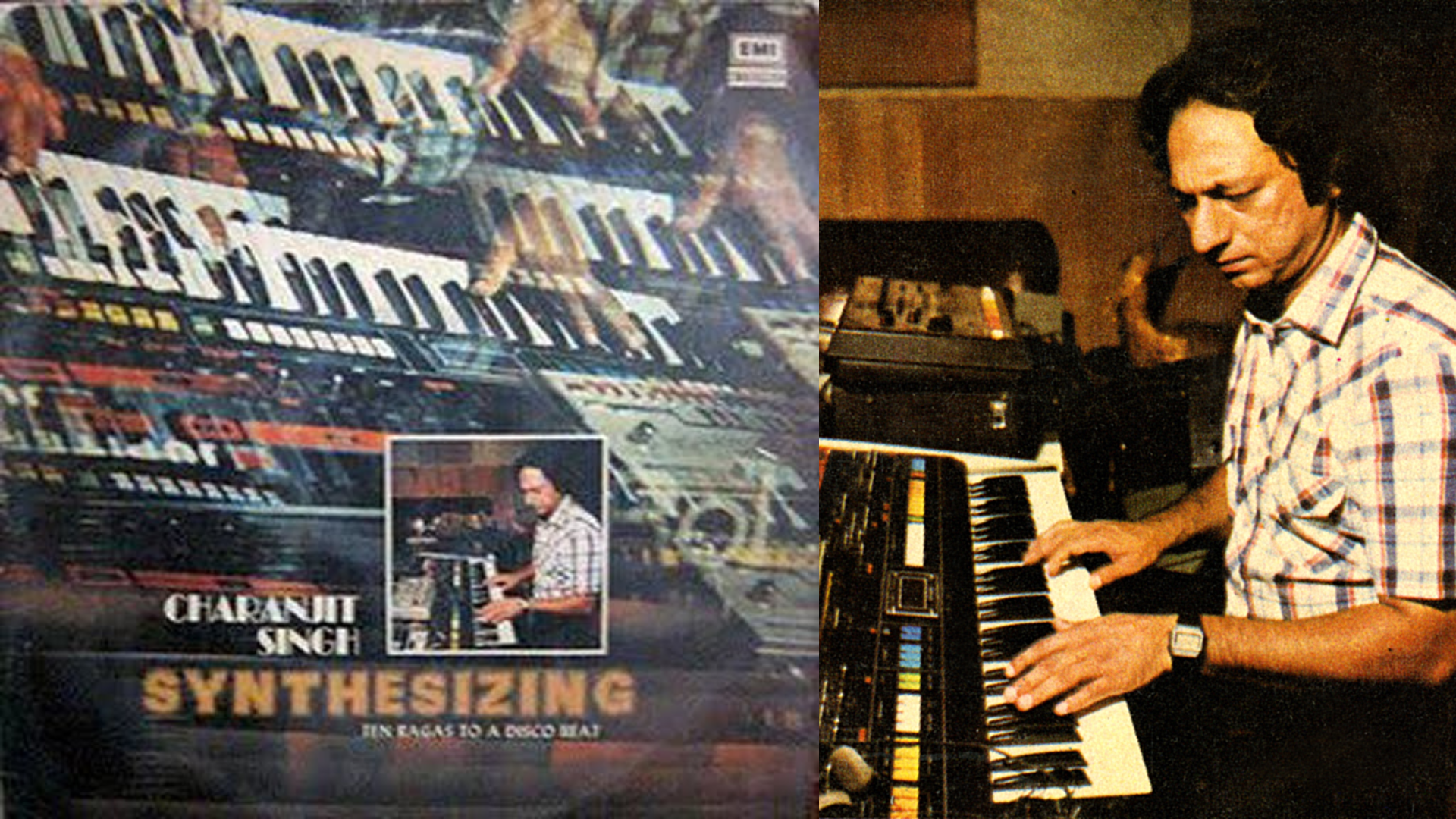


Comments
Sandy —
Very interesting article like no other I have read. I read it because I was curious about the death of Robert Plant’s son. I knew about Jimmy Page living in Crowley’s house, how he practiced magic and practiced one pointed concentration while writing music and perfecting his guitar skills. It’s scary that anytime there is an offering on an alter during a ritual there needs to be a sacrafice. A death. I don’t know if the sacrafice needs to occur at that present moment on the alter or sometime afterwards. It makes me wonder if that is why Plant’s son died. Was he an offering? It makes me think of many brilliant musicians who have lost a child. Eric Clapton’s son died at a very young age falling out of a high rise apartment window. Motley Crue front man’s daughter Skylar died at age 3. There are many others you’ll find once you start researching it all. I stay away from it now as I used to study the occult. I can’t afford to lose my soul over some do as thou wilt temporary power. No way. No thank you. Amen
Peter J —
Good article. I lived and grew up in the same town as Rob Plant and attended high school a stones throw from his house in the 70’s. I knew and know the pubs he drinks in and performed in Led Zepp in Kidderminster. I know where he lives now on the outskirts of Kidderminster. I have long been a fan of his and wish to start a once or twice yearly one day guided tour of his old and current haunts. For info and interest please email me- canuck777@outlook.com
Ben —
Your article on the curse of Led Zeppelin was very interesting. I do believe that something unnatural did follow the band around with negative effects. And of course the most striking is the fact that a guitar god and composer like Jimmy Page, never again wrote a masterpiece of music. Weird but true.